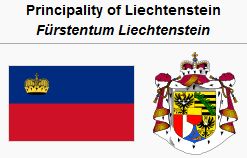Difference between revisions of "Liechtenstein"
| [unchecked revision] | [unchecked revision] |
GameoAdmin (talk | contribs) (CSV import - 20130816) |
GameoAdmin (talk | contribs) (CSV import - 20130820) |
||
| Line 1: | Line 1: | ||
| − | + | [[File:Liechtenstein1.jpg|300px|thumb|right|''Source: [http://en.wikipedia.org/wiki/File:Location_Liechtenstein.png Wikipedia Commons] Wikipedia Commons | |
'']] [[File:Liechtenstein2.jpg|300px|thumb|right|''Source: [http://en.wikipedia.org/wiki/File:Location_Liechtenstein.png Wikipedia Commons] Wikipedia Commons | '']] [[File:Liechtenstein2.jpg|300px|thumb|right|''Source: [http://en.wikipedia.org/wiki/File:Location_Liechtenstein.png Wikipedia Commons] Wikipedia Commons | ||
| Line 5: | Line 5: | ||
'']] <h3>Introduction</h3> The Principality of Liechtenstein is the fourth smallest country in Europe and is bounded by [[Switzerland|Switzerland]] and [[Tyrol (Austria)|Tyrol]]. Total area is 160 km<sup>2</sup> (62 square miles) and the population in 2010 was estimated to be 35,981. In 2000, 78.4% of the population was Roman Catholic, 7.9% belonged to the Reformed Church, 1.5% belonged to other Christian denominations, 4.8% were Muslim, 0.4% belonged to a religion other than Christianity and Islam, and 7% were undeclared or had no religion. | '']] <h3>Introduction</h3> The Principality of Liechtenstein is the fourth smallest country in Europe and is bounded by [[Switzerland|Switzerland]] and [[Tyrol (Austria)|Tyrol]]. Total area is 160 km<sup>2</sup> (62 square miles) and the population in 2010 was estimated to be 35,981. In 2000, 78.4% of the population was Roman Catholic, 7.9% belonged to the Reformed Church, 1.5% belonged to other Christian denominations, 4.8% were Muslim, 0.4% belonged to a religion other than Christianity and Islam, and 7% were undeclared or had no religion. | ||
| − | <h3>1957 Article</h3> In the Vaduz area a [[Hutterian Brethren (Hutterische Brüder)|Hutterian Brethren]] Bruderhof was formed in 1934, modeled on those of the Hutterian Brethren in the 16th century. It was an offshoot of the Rhönbruderhof near Neuhof ([[Fulda (Hesse, Germany)|Fulda district]]), was set up near Triesenberg above Vaduz (elevation 5,170 ft.) and was called the [[Almbruderhof (Liechtenstein)|Almbruderhof]] Silum, which was moved to England in 1938. | + | <h3>1957 Article</h3> In the Vaduz area a [[Hutterian Brethren (Hutterische Brüder)|Hutterian Brethren]] Bruderhof was formed in 1934, modeled on those of the Hutterian Brethren in the 16th century. It was an offshoot of the Rhönbruderhof near Neuhof ([[Fulda (Hesse, Germany)|Fulda district]]), was set up near Triesenberg above Vaduz (elevation 5,170 ft.) and was called the [[Almbruderhof (Liechtenstein)|Almbruderhof]] Silum, which was moved to England in 1938. |
| − | |||
| − | |||
= Bibliography = | = Bibliography = | ||
Hege, Christian and Christian Neff. <em>Mennonitisches Lexikon</em>. Frankfurt & Weierhof: Hege; Karlsruhe; Schneider, 1913-1967: v. II, 650. | Hege, Christian and Christian Neff. <em>Mennonitisches Lexikon</em>. Frankfurt & Weierhof: Hege; Karlsruhe; Schneider, 1913-1967: v. II, 650. | ||
Wikipedia. "Liechtenstein." [http://en.wikipedia.org/wiki/Leichtenstein http://en.wikipedia.org/wiki/Leichtenstein] (accessed 10 February 2010). | Wikipedia. "Liechtenstein." [http://en.wikipedia.org/wiki/Leichtenstein http://en.wikipedia.org/wiki/Leichtenstein] (accessed 10 February 2010). | ||
| − | |||
| − | |||
{{GAMEO_footer|hp=Vol. 3, p. 337|date=1957|a1_last=Hege|a1_first=Christian|a2_last=|a2_first=}} | {{GAMEO_footer|hp=Vol. 3, p. 337|date=1957|a1_last=Hege|a1_first=Christian|a2_last=|a2_first=}} | ||
Revision as of 19:23, 20 August 2013

Introduction
The Principality of Liechtenstein is the fourth smallest country in Europe and is bounded by Switzerland and Tyrol. Total area is 160 km2 (62 square miles) and the population in 2010 was estimated to be 35,981. In 2000, 78.4% of the population was Roman Catholic, 7.9% belonged to the Reformed Church, 1.5% belonged to other Christian denominations, 4.8% were Muslim, 0.4% belonged to a religion other than Christianity and Islam, and 7% were undeclared or had no religion.
1957 Article
In the Vaduz area a Hutterian Brethren Bruderhof was formed in 1934, modeled on those of the Hutterian Brethren in the 16th century. It was an offshoot of the Rhönbruderhof near Neuhof (Fulda district), was set up near Triesenberg above Vaduz (elevation 5,170 ft.) and was called the Almbruderhof Silum, which was moved to England in 1938.
Bibliography
Hege, Christian and Christian Neff. Mennonitisches Lexikon. Frankfurt & Weierhof: Hege; Karlsruhe; Schneider, 1913-1967: v. II, 650.
Wikipedia. "Liechtenstein." http://en.wikipedia.org/wiki/Leichtenstein (accessed 10 February 2010).
| Author(s) | Christian Hege |
|---|---|
| Date Published | 1957 |
Cite This Article
MLA style
Hege, Christian. "Liechtenstein." Global Anabaptist Mennonite Encyclopedia Online. 1957. Web. 3 Feb 2026. https://gameo.org/index.php?title=Liechtenstein&oldid=83190.
APA style
Hege, Christian. (1957). Liechtenstein. Global Anabaptist Mennonite Encyclopedia Online. Retrieved 3 February 2026, from https://gameo.org/index.php?title=Liechtenstein&oldid=83190.
Adapted by permission of Herald Press, Harrisonburg, Virginia, from Mennonite Encyclopedia, Vol. 3, p. 337. All rights reserved.
©1996-2026 by the Global Anabaptist Mennonite Encyclopedia Online. All rights reserved.
